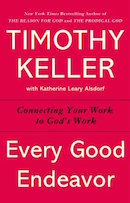Work Is Not the Way It’s Supposed to Be
Blog / Produced by The High Calling
When I was a kid, my parents decided to build their own home. It was a marvelous plan – a beautiful house in the suburbs, custom-built on a wooded lot next to a lake. The builder they hired promised amazing things – several sliding glass doors so there would always be an unobstructed view of the lake. Decks on the front and the back so that we could enjoy the outdoors. A beautiful wood beam across the vaulted ceiling in the living space.
He began building and the issues began to percolate. Things did not line up right. Door frames were not plumb. Some sliding glass doors worked fine, others were nearly impossible to open. The beam across the middle of the vaulted ceiling was so heavy that there were cracks appearing down the walls. The deck wood began to bow within the first few months. And then after the builder received enough payment for his shoddy work, he shut down his business and moved to Florida – the job not even finished.
This was not the way it was supposed to be.
From the very beginning, God has had a plan for a cohesive harmonious creation. The first humans lived completely integrated lives: They worshiped God as they worked the Garden. They cared for one another and took care of the creation. Complete harmony and universal flourishing were what characterized humanity’s experiences with God, themselves, and the rest of creation. Those first humans enjoyed their work and it had great meaning: It was the means by which they maintained and expanded upon what the Bible calls shalom.
Cornelius Plantinga, Jr., in his book, Not the Way It's Supposed to Be, defines shalom for us:
“The webbing together of God, humans, and all creation in justice, fulfillment, and delight is what the Hebrew prophets call shalom. In English we call it peace, but it means far more than just peace of mind or ceasefire between enemies. In the Bible shalom means universal flourishing, wholeness, and delight—a rich state of affairs in which natural needs are satisfied and natural gifts fruitfully employed, a state of affairs that inspires joyful wonder as the creator and savior opens doors and speaks welcome to the creatures in whom he delights. Shalom, in other words, is the way things are supposed to be.”
Ahh… The way it is supposed to be. Sounds so good. Sounds so right. But it also sounds pie-in-the-sky. Our experience of shalom is fleeting and infrequent, and we are frustrated by that.
The Bible explains that because of the rebellion of humanity against God’s good intention for our lives, shalom is not the way it is anymore. Instead of work consistently being done for the flourishing of all, work is often just a means to other ends, sinful ends. Natural gifts that should be fruitfully employed to satisfy the needs of others now so often are selfishly used to meet our own evil desires. Instead of seeking the flourishing of other humans as well as the non-human creation, we far-too-often use people and resources, we manipulate people and exploit things for our own advantage.
In another book, Plantinga explains
“We might define evil as any spoiling of shalom, any deviation from the way God wants things to be. Thinking along these lines, we can see that sin is a subset of evil; it's any evil for which somebody is to blame – sin is culpable evil...
Sin grieves God, offends God, betrays God, and not just because God is touchy. God hates sin against himself, against neighbors, against the good creation, because sin breaks the peace... God is for shalom and therefore against sin."
-Cornelius Plantinga, Jr., Engaging God’s World: A Christian Vision of Faith, Learning, and Living
Our current experience with work is indeed not the way it is supposed to be. And God knows it.
And God is doing something about it in Jesus Christ.
Paul wrote to the Colossians,
“For God was pleased to have all his fullness dwell in him (Christ), and through him to reconcile to himself all things, whether things on earth or things in heaven, by making peace through his blood, shed on the cross. (Col 1:19-20)
When an Israelite read the word “peace” in that passage, he would have thought immediately of the concept of shalom. Jesus, the “Prince of shalom,” reconciles all things back to God, creating once again the opportunity for universal flourishing.
And, amazingly, he invites us, his followers, to participate in the re-establishment of shalom!
When the people of God found themselves exiled in the evil nation of Babylon, God commanded them to do something quite shocking. He told them to “seek the peace and prosperity of the city to which I have carried you into exile. Pray to the LORD for it, because if it prospers, you too will prosper.” (see Jeremiah 29:4-7, NIV)
Those words “peace and prosperity” (other translations read “welfare”) actually translate the single Hebrew word shalom.
Does it surprise you that God commands his people to seek the shalom of pagan Babylon? Isn’t it remarkable that God’s desire is for everyone, even those diametrically opposed to him, to experience shalom? Are you living in a modern Babylon? Do you find your workplace to be as unbearable as living in Babylon? Does your boss remind you of Nebuchadnezzar? We might joke about this, but for some of us, this might not be too far from our experience.
How does God bring shalom into today’s world? Through his people. Through you and me.
How can you bring shalom…
…in your workspace: What people do you work with that you can pray for and care for?
…in your institution: In what ways can you help restore your institution’s calling to be a blessing, to increase the shalom of customers, clients, suppliers, employees, and stakeholders?
…in your city / community: How does, or how can, your institution, your family, and your church contribute to the common good of the community in which you are a member?
…in the world: How can you influence your institution, your family and your church to contribute to the common good, bringing shalom into the world? How can you contribute to restoring your institution’s call to bring shalom to the end users of the product or service?
In what ways can you restore flourishing (shalom) in and through your vocation?
Post by Bob Robinson, Faith Editor for The High Calling and the Executive Director of The Center to Reintegrate Faith, Life, and Vocations. Follow Reintegrate's tweets at @re_integrate and Bob's personal twitter at @Bob_Robinson_re





